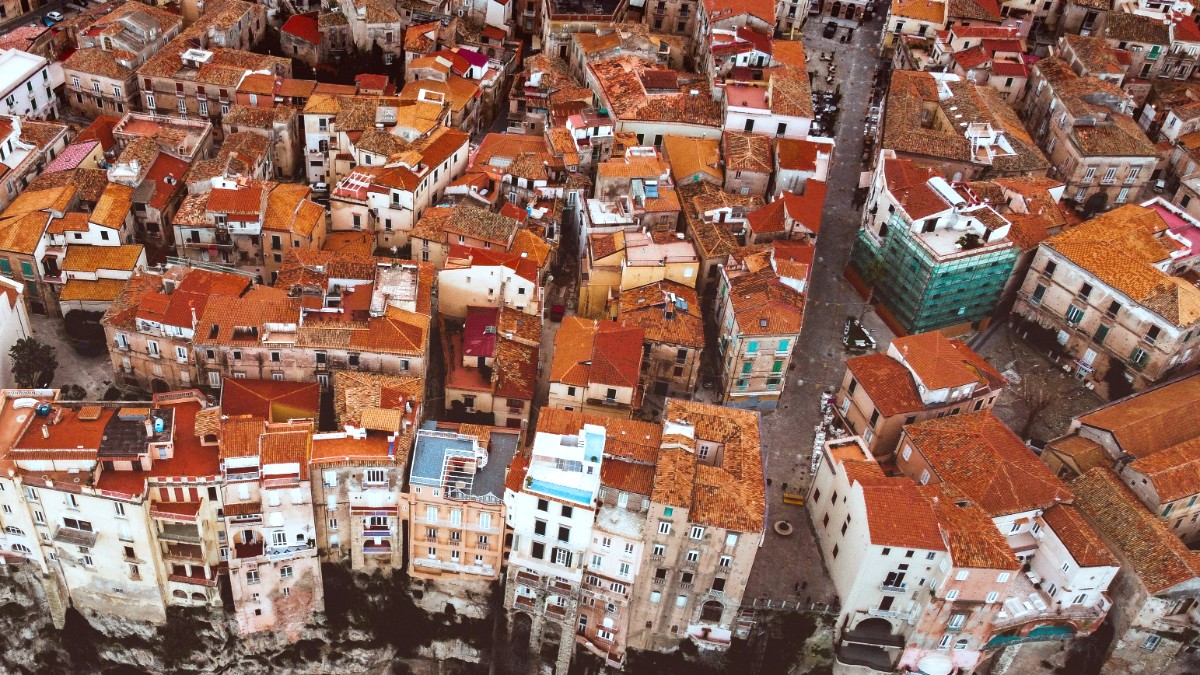
Italy
Calabrian cuisine is hearty, flavorful, and often spicy. It shows the region's agricultural richness and long history, with Greek, Roman, Arab, Norman, Aragonese, and Bourbon influences.
Tropea's cuisine highlights its coastal location with abundant fresh seafood. It also features the famous sweet red onion, a local culinary icon. The food is simple, based on high-quality ingredients.
A "coperto" (cover charge) is common in Italian restaurants. It is a per-person charge, usually a few Euros, and often includes bread. It is standard practice.
Tipping is not obligatory in Italy. If service is exceptional, rounding up the bill or leaving a few Euros (5-10%) is appreciated, but not expected.
Italians typically drink espresso standing at the bar. Cappuccino is a breakfast drink, not ordered after lunch. Never ask for parmesan on seafood pasta dishes.
Pasta with spicy, spreadable pork sausage. The sausage melts into a rich, spicy sauce.
Find this in most traditional restaurants in Tropea.
Traditional Calabrian pasta with sweet red onion sauce, sometimes with local tomatoes or 'Nduja.
A true Tropea specialty. Look for it in local trattorias.
Grilled swordfish. Showcases the freshness of the local catch, prepared with olive oil, lemon, and herbs.
Seek out restaurants near the port or those with strong seafood reviews.
Red onion ice cream. A unique local treat balancing sweetness with a creamy texture.
Iconic chocolate ice cream dessert from nearby Pizzo. Chocolate-hazelnut ice cream with liquid chocolate center.
A few upscale restaurants offer a refined take on Calabrian cuisine. They focus on fresh, high-quality ingredients, artistic presentation, and curated wine lists.
This is the most common dining type in Tropea. It balances quality ingredients, traditional flavors, and reasonable prices.
Pizzerias for slices, paninoteche for sandwiches, bars for snacks with drinks. Street food stalls appear during summer/festivals.
Italian cuisine has many vegetarian options: pasta with tomato-based sauces, vegetable risottos, salads, pizzas without meat.
Vegan options need specific requests. Ask if dishes contain cheese, butter, or eggs.
Halal and kosher choices are very limited. Consider preparing your own meals or focus on naturally compliant fish/vegetarian dishes. Awareness of gluten-free options grows.
Inform your server about any allergies. A translation app or chef card are useful for severe allergies.
Learn Calabrian cuisine, local pasta types, traditional sauces. Inquire with local tourism offices or accommodation.
See how Tropea red onions are grown, learn about olive oil, or 'Nduja sausage production. Direct connection to local ingredients.
Sagra della Cipolla Rossa (Red Onion Festival) in late July. Tastings, culinary demonstrations, entertainment.
Dining with a panoramic sea view is a signature Tropea experience. Stunning sunset views.
Visit local farms in the surrounding countryside. See Tropea red onions, learn about olive oil production.
Discover 'Nduja sausage making. A understanding of agricultural heritage.
Learn about Bergamot, the unique citrus fruit grown only in Calabria.
Some tours specifically include visits to these food producers.
Many restaurants are on the cliffside or have terraces overlooking the Tyrrhenian Sea.
Look for restaurants advertising "vista mare" (sea view). A distinct Tropea experience.
Local tour operators or specific B&Bs may offer cooking classes. These often center on Calabrian cuisine, showing how to prepare local pasta types, traditional sauces, or dishes highlighting the Tropea red onion.
Opportunities exist to visit local farms in the surrounding countryside. See how the famous Tropea red onions are grown, learn about olive oil production, or discover how 'Nduja sausage is made.
Dining with a panoramic sea view is a signature Tropea experience. Many restaurants are on the cliffside or have terraces overlooking the Tyrrhenian Sea.
These festivals celebrate various local products like fish, wine, or specific fruits.
Check local event calendars for specific dates.
During summer festivals, anticipate many street food stalls. These sell fried fish, local sweets, savory snacks, and dishes highlighting the red onion.
Christmas and Easter also bring specific traditional sweets and baked goods.
Use a translation app to communicate specific dietary needs. Learning a few Italian phrases is beneficial.
Speaking directly with restaurant staff or accommodation hosts is the most effective approach for dietary concerns.
HappyCow app and website discover vegetarian and vegan-friendly restaurants globally.
Embrace the regional flavors for an authentic culinary journey.